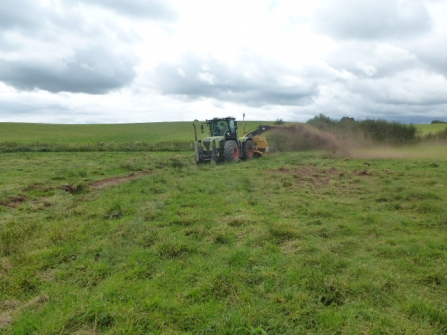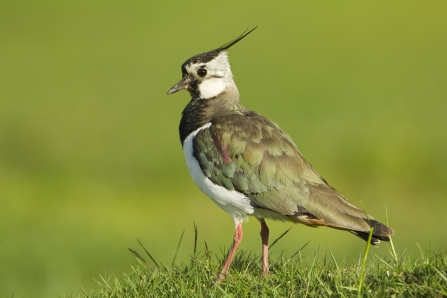An impressive piece of machinery was drafted in to complete the task when the RSPB owned rotary ditching machine made its way up from Oxfordshire to Bickley to create the ‘scrapes’, essentially, shallow, sinuous channels in fields. Over the course of three days the specialist-ditching machine was used to create nearly 1 kilometres of meandering three metre wide scrapes.
Cheshire Wildlife Trust creates home for wading birds
Scrape at Bickley Hall Farm c. Ben Gregory

Rotary ditching machine Bickley Hall Farm c. Ben Gregory
“The design of the scrapes, is critical to the wildlife they will support,” explained Ben Gregory, Area Manager South, part of the expert conservation team at Cheshire Wildlife Trust. “With their flowing design and gentle sloping edges, we’re hoping they’ll provide the perfect feeding habitat for wading birds and our quest to increase the number of breeding waders such as lapwing, curlew and redshank at Bickley Hall Farm will be one step closer.
The Trust currently manage 50 acres of low-lying, wet grassland at the farm, which is grazed by cattle during spring and-summer. Back in 2016, they designed a scheme of works to enhance the wetland habitat to make it more wildlife-friendly.

Lapwing c. Mark Hamblin/2020VISION
The work included creating 2700m² of new linear scrapes and installing a series of adjustable sluices on some their ditches to control water levels. “The idea is to retain water in the fields throughout winter and into spring,” said Ben Gregory. “Recent studies have shown that creating wet features such as these scrapes in agricultural fields is highly beneficial for aquatic wildlife such as water beetles and flies. These provide a valuable food source for wading birds such as lapwing and snipe and farmland birds such as tree sparrow - all of which are regularly seen at Bickley Hall Farm.”
The work has been funded through the Natural England Countryside Stewardship scheme.
